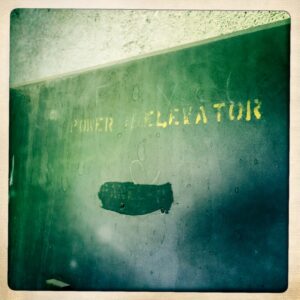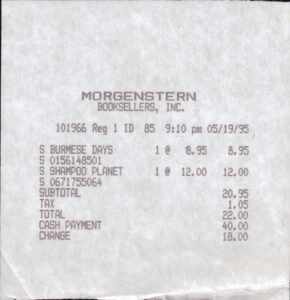I’m still editing this book. It’s going to take a while, and I hate this part of the process more than anything, because it’s not the process of creating, of writing hundreds and thousands of words, and it’s not the process of holding a finished book in your hands, so it’s painstaking. And I have all of these crazy ideas popping in my head that don’t fit within this book, for the next one or the one after, and it’s a beast to try and write those down and not forget them while I’m doing the equivalent of removing cat hair from a mohair sweater. But it’s getting there.
I have a 115,000-word manuscript that’s a complete train wreck, something that’s a book like Summer Rain but covers the entire six years I was in Bloomington. I’ve all but written off Summer Rain, partly because that’s not what I write anymore, and partly because there’s a certain pain to nostalgic autobiographical fiction that I like a bit too much to spend all of my time with it. In many senses, I think of Summer Rain as a failure, and use that to justify never going back to that kind of writing. But since the book went to Kindle, a couple of people have read it and said it really resonated with them, which makes me wonder if I was on to something.
Anyway, here is part of a story, or rather an experience, that I outlined and forgot. It’s not a story story, it’s just some loose thoughts.
I used to have a bus pass at IU, when I was a freshman. I guess now the buses at IU are free, but back then, you had to pay some obscene amount to get a little sticker on your ID so you could ride them. You could also pay a fraction of that for a nights and weekends pass, which is what I did. I didn’t have a car, so I’d take the bus out to College Mall all the time. It was a huge pain in the ass, but it beat walking.
I had a really good friend, V, this girl who was also on the computer all the time, and even though she was only about a year older than me, we had this almost big sister/little brother relationship, and she’d always listen to me pule about my various relationship problems. She wanted to be a shrink, and I was crazy, so this dynamic worked well, and we traded emails pretty much daily.
I used to call her dorm a lot, and she’d never be there, because computers cost more than cars, and nobody had them, so you’d go camp out in a computer cluster to get your fix. And I used to leave messages so much with her roommate L that we started chatting, asking each other about our days, and that led to conversations, and that led to me calling L just to talk to her, and not V. We’d have these marathon phone sessions, even though we never met in person, maybe because we never met in person. In these strange, protracted, intimate, three or four hour long confessionals, we talked about love and sex and partners and life and fears and hopes. And we’d flirt, and joke around, but it never became a “hey, let’s go grab a drink” or “let’s put a name to a face” – there was never an attempt at conversion, in crossing over to the other side. And we did have these insane talks about sex every once in a while, at two in the morning, where she’d confess that she could have twenty-minute orgasms or I’d talk about how I was certain my English teacher was trying to fuck me. But it was all in this strange meta-platonic phase, where we were more than friends, but never attempting to become more than friends.
I always say I never seriously became a writer until 1993, but there were fits and spurts where I’d try to knock out a short story, or I’d do something for a class, and I’d want to get serious about it. And I took the freshman writing class that first semester, and read a lot of Vonnegut, and I was an insomniac, so I’d bang out these depressing science fiction stories, and email them to her, and she’d be incredibly interested in them. And I still have some of them, and they really suck, so who knows what she was smoking. But if you want to be a writer and you show someone a story you can’t even show your girlfriend or best friend and they completely swoon over it and ask you questions about it and are genuinely impressed by it, that’s like the biggest thing they could possibly do to push a latent infatuation over the edge.
I eventually met L, ran into her at a computer lab with V, just a quick hi/hello/good to see you. She was far more beautiful than I expected. It put me in this awkward situation because she confided in me, and we talked almost every day about incredibly intimate things, but that safe place was possible because of the physical disconnect. Now we knew what we looked like, and I found her absolutely stunning, and I couldn’t really do anything about it. And I would normally email with V about these things, but this was the one person I couldn’t talk to her about. (And I was in a relationship, albeit a bad one. And L had a boyfriend too, although he was a jerk and treated her like shit, of course.)
My brain was stuck in this lurch, but I never admitted it, because I think I depended on L so much to get through that year. We would email or chat online pretty much all day every day: good mornings, good nights, the day’s frustrations, the problems with partners. I could tell her things I could not tell my girlfriend or best friends, and she was the same. We kept this line we would never cross, but it many ways, we went way past the line. It was all so comforting and supportive and wonderful, but it was also something I always feared would suddenly end when she found out how I really felt about her, or I did something stupid, or she somehow found out how much of an idiot I really was.
Anyway, the bus. I went to College Mall one night, a Friday night right before the holiday break started, when me the loser had nothing to do but go to the mall and buy Christmas candy. I went to wait for the bus, which only showed up every half hour or so, and the one person also waiting out there in the dark and cold was L. Even though our couple of in-person meetings prior to this consisted of a few dozen words while we sat at computers, we had a long time to talk, waiting for the goddamn bus to show up, and it ended up becoming another one of those long brain dumps, where we both bitched about the problems with our respective partners. I’d had a hellish Thanksgiving with my then-girlfriend, and seriously wanted to break things off with her, but instead I either invited her or got talked into inviting her to spend a week at my mom’s, which I dreaded even more than the prospect of spending the holidays at home. L had some similar turmoil going on, and we talked about that. It was back to our old pattern though, the deep dive through emotions, which felt strange while we were sitting right next to each other, but was just as immersive and familiar as when we used to do it in the middle of the night over the phone.
The bus came, and we got on board, grateful for the warmth, but because of the weird bus route, it had to go out away from the mall and then sit for 15 minutes behind the Kroger grocery while the driver took a break, before it started the loop again and went back to campus. I shared my Christmas candy with her, and we talked more, flirted, but mostly just enjoyed the time sitting next to each other, alone on this giant GMC bus. When you spend that much time in a relationship with someone, even this accelerated, half-friends half-whatever relationship, you develop your own shorthand and inside jokes and patterns and ways of speech, and we had so much of that. We could finish each others’ sentences, and had a kind of intimacy that I didn’t have in my “real” relationship. It was like some Meg Ryan movie, like I was the Billy Crystal, like we were the just friends that were so much more, and at the end of Act 3, she’d meet me at the top of the Empire State Building and we’d have the happily ever after.
That never happened, of course. V went to Germany the next year, or maybe it was Austria, and when she came back, it was a lifetime later, five or six iterations of the college friendship cycle, and we only talked one or two times since. I don’t know when or how I lost touch with L, but I did. This was 1990, and people didn’t check their email over the summer unless they were really wired in and their parents had computers with modems, which was pretty much nobody in my circle. We could have written letters, or made long-distance phone calls, but we didn’t. And in college, sometimes you are closer to a person than you have been with anyone in your entire life, and then six months later, they’re yet another stranger among the 40,000 other strangers on that big ten campus, and you’re dumping your heart out to someone completely different.
In the fiction story version of the tale, something would have happened. Our hands would have touched, met, joined, and we would have known what had to happen next. Something illicit and unsaid would transpire after that bus ride, a quiet walk back to a dorm room where a roommate was out of town for the weekend, no exchange of words, a torrid exchange of pent-up energy in the darkness. And even if the happily ever after didn’t happen, there would be a long night where our real lives didn’t matter, even if would end with the heartbreak of her going back to her stupid boyfriend and me dealing with the girl I’d end up dumping a few months later.
In reality, I saw L maybe three years later. I was in the back of my favorite record store, and saw her enter. She looked completely spent, different than the innocence mixed with sophistication of what I remembered, beaten by life and dreams unfulfilled. She was in the middle of a fight with some beardo guy, a boyfriend who followed her around like a trained lap dog, apologizing profusely for everything and nothing while she hurled insults and complained about the imaginary. I didn’t talk to her; I didn’t even want to acknowledge that it was her, for fear it would kill that perfect memory of what we had and didn’t have before.
And that was twenty years ago. All of those emails with V are lost; all of the memories of L are slowly fading from my brain. The record store is gone, the owner dead. I’m here, thousands of miles removed. And I’m writing this crazy book about a bizarre reality that’s a laugh a minute, and exactly what I want to write, but thinking about these distant episodes and revisiting them in my head makes me wonder not only what could have been, but what could end up being another story in another book that I might or might not someday finish.


